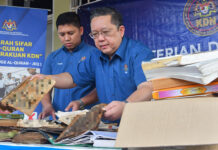The ASEAN Taxonomy Board (ATB), representing ASEAN finance sectoral bodies, announced the completion of targeted stakeholder consultation for Version 2 of the ASEAN Taxonomy for Sustainable Finance (ASEAN Taxonomy), it said in a statement yesterday.
“This represents a significant milestone in validating the region’s journey towards sustainability and climate resilience and demonstrates the ATB’s commitment to providing crucial guidance to support environmentally responsible economic activities,” said the ATB.
Earlier this year, the ATB released Version 2 of the ASEAN Taxonomy, which featured the completed Foundation Framework, offering detailed methodologies for assessing various economic activities.
Following this release, the ATB embarked on a targeted consultation with key stakeholders within the ASEAN region and beyond, engaging more than 1,300 stakeholders and 250 organisations through written feedback, roundtable sessions, and interviews.
A key tenet of the ASEAN Taxonomy is to facilitate a just transition, which will continue to drive the development of the next phases of the Taxonomy.
In this regard, stakeholders affirmed the Taxonomy’s use of a traffic light-based system as a helpful tool in supporting companies in its transition finance journey.
Stakeholders welcomed the Taxonomy’s inclusive approach in accommodating companies at various stages of development.
In particular, the Foundation Framework offers a starting point for businesses embarking on their sustainability journeys while the Plus Standard gives an opportunity for companies with greater data availability to demonstrate their commitment to stringent thresholds and classification requirements.
Stakeholders also welcomed the ASEAN Taxonomy as a credible, science-based tool and the Taxonomy’s emphasis on interoperability, in particular, the alignment of the Plus Standard’s Green Tier with the EU Taxonomy.
Furthermore, the inclusion of coal phase-out as an activity in the Plus Standard was commended. The criteria would help to encourage decarbonisation by reducing dependence on coal power in the region.




















































